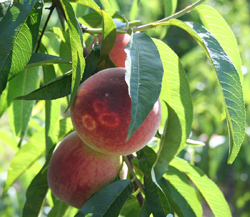Protecting stone fruit trees against Sharka disease
The acidic and deformed fruits that develop as a result of Sharka cannot be marketed. Moreover, the only way to limit the disease spread is to destroy all trees infected with the causal agent, the plum pox virus (PPV). An EU-funded initiative known as 'Sharka containment' (SHARCO) was established to develop knowledge and tools to help stone fruit producers minimise the risk of infection. The project focused particularly on European countries where the virus is endemic. Producers now have access to PPV-resistant plant materials, accurate and reliable methods of PPV detection, guidelines, early warning systems and a decision support system. Researchers also gained insights into viral diversity and identified the driving factors behind the spread of PPV. Project members covered every relevant aspect of stone fruit vulnerability, from seedling production to grafting and orchard management. The resultant tools will allow producers to contain the spread of the disease in both orchards and nurseries. A combination of measures provided by the SHARCO project is expected to significantly reduce the incidence of PPV, which should secure the trade of stone fruit.



